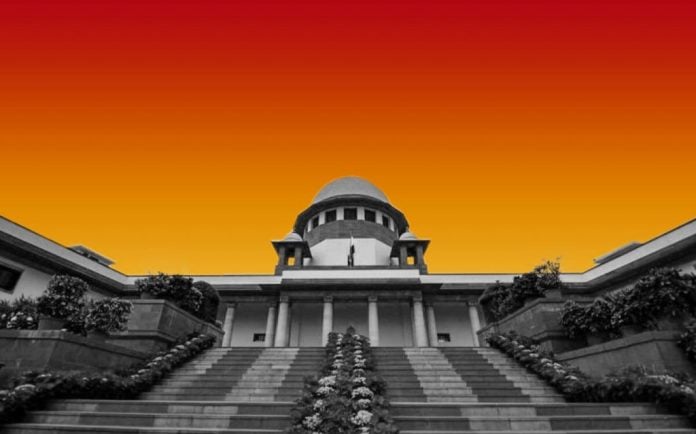The Supreme Court on Thursday permitted 73-year-old human rights activist Gautam Navlakha, an accused in the Bhima Koregaon violence case, to be transferred from Taloja Prison, where he is currently lodged, to house arrest for one month, on medical grounds.
The Bench of Justice K.M. Joseph and Justice Hrishikesh Roy passed an interim order for his one-month house arrest in Mumbai, considering his age and medical conditions.
The Apex Court directed the National Investigation Agency to evaluate premises where he will be placed within 48 hours from today.
Navlakha was told not to use mobile phone, internet, laptop or any other communicating device. He was permitted to use a mobile phone provided by the police for 10 minutes in a day in presence of police personnel. Only his sister and daughter were allowed to visit him once a week for three hours.
The top court of the country asked Navlakha to deposit Rs 2.4 lakh for expenses incurred by the state in providing police security.
The top court of the country directed that Navlakha’s house will remain under surveillance. Police personnel will be deployed outside the residence, while CCTV cameras will be installed outside the rooms and at both entry and exit points of the house.
He was told not to leave the house under any circumstance, except for walks in the company of Police personnel. The activist was also prohibited from talking to any person during walks.
The Centre told the Apex Court that the medical report filed by Jaslok Hospital may be tainted as Navlakha’s brother-in-law, a doctor, was part of the medical board.
Earlier on Wednesday, the Apex Court had directed NIA to apprise it about restrictions to be placed for shifting Navlakha to house arrest on medical grounds.
NIA had claimed that Navlakha was in ‘touch’ with Kashmiri extremists and even Pakistan intelligence agency ISI. It further said that the agency would be unable to prevent the activist from writing mails during house arrest.The Counsel for NIA produced documents procured from the US court, which allegedly linked the activist to ISI agent Ghulam Nabi Fai, who was convicted in the US for accepting funds from the ISI.
As per NIA, the documents showed that Navlakha was ‘introduced’ to an ISI General for recruitment by Fai at ISI’s direction.
However, the Apex Court said that it recognised house arrest as a form of custody. Stating that house arrest will not go on till eternity, the Court told NIA to place before it the restrictions it wanted to put for house arrest of the accused.
The top court of the country further took note of Navlakha’s plea, which had cited dental problems and skin allergies, besides permission to undergo colonoscopy for suspected cancer.
Representing Navlakha, Senior Counsel Kapil Sibal said the charge sheet in the case was filed in October 2020, but charges were yet to be framed. The Bench termed this development as ‘disturbing’.
Appearing for NIA, Additional Solicitor General (ASG) S.V. Raju contended that the delay was part of a ‘well-thought-out strategy’ by the accused to delay the proceedings. He said the applications were being filed day in and day out, with the purpose of hampering the investigation, as well as halting the progress of the trial. The investigation officer had to run from one court to another, preparing affidavits. This was not something natural, he added.
The ASG requested the Apex Court to call for records of the lower court and look at how many applications were filed almost every alternate day. He said that 16 discharge applications were pending. The accused was not getting bail because of the merits of the case, he added.
Raju further said that the accused went to the court and said the trial was being delayed. The reason for delay was that the accused was filing one after the other discharge applications for delaying the trial, he noted.
The ASG alleged that the accused wanted bail ‘by hook or crook’. It was part of this strategy – if bail cannot be granted on a regular basis, go for medical. He also pointed to the affidavit, which cited letters allegedly exchanged between Navlakha and top Maoist Katkam Sudharshan alias Anand.
NIA further produced a letter, which it said had been recovered from Navlakha. The letter talked about persuading young activists from Delhi, Mumbai and CG (Chhattisgarh) to join the Maoist revolution.
As per Raju, Navlakha was actively supporting the guerrilla movement, which resulted in the death of a large number of paramilitary personnel. He was also connected to the Maoist party “in a big way,” alleged the agency.
However, Sibal said that there was no evidence to support the NIA’s claims.
The Apex Court then fixed the matter for further hearing on Thursday.
Earlier on September 29, the Supreme Court had directed the Taloja Jail Superintendent to immediately shift Navlakha to Mumbai’s Jaslok hospital for treatment.
Navlakha had moved the top court of the country against the April 26 order of the Bombay High Court, which rejected his plea for house arrest over apprehensions of lack of adequate medical and other basic facilities in Taloja jail near Mumbai, where he is currently lodged.


